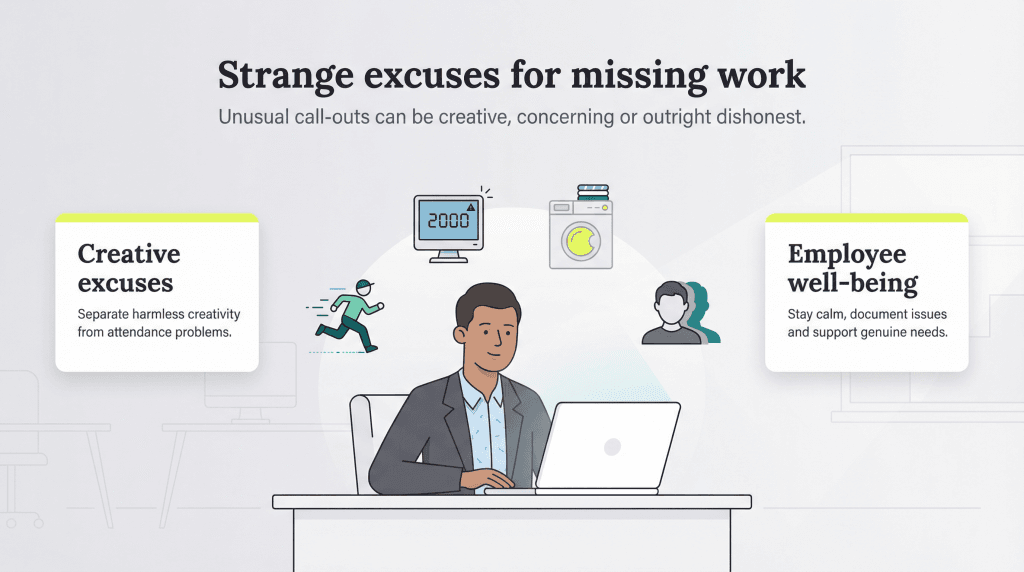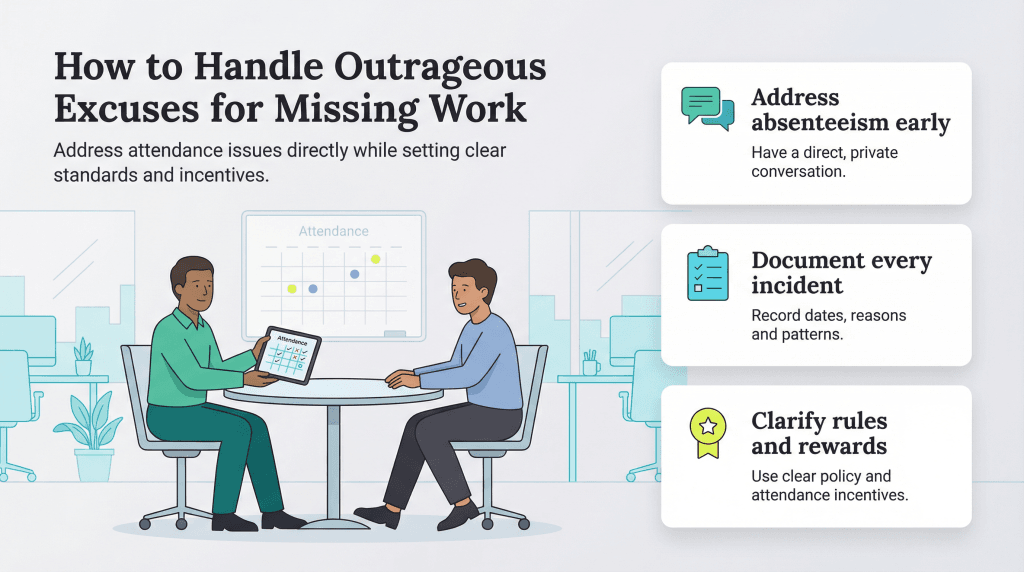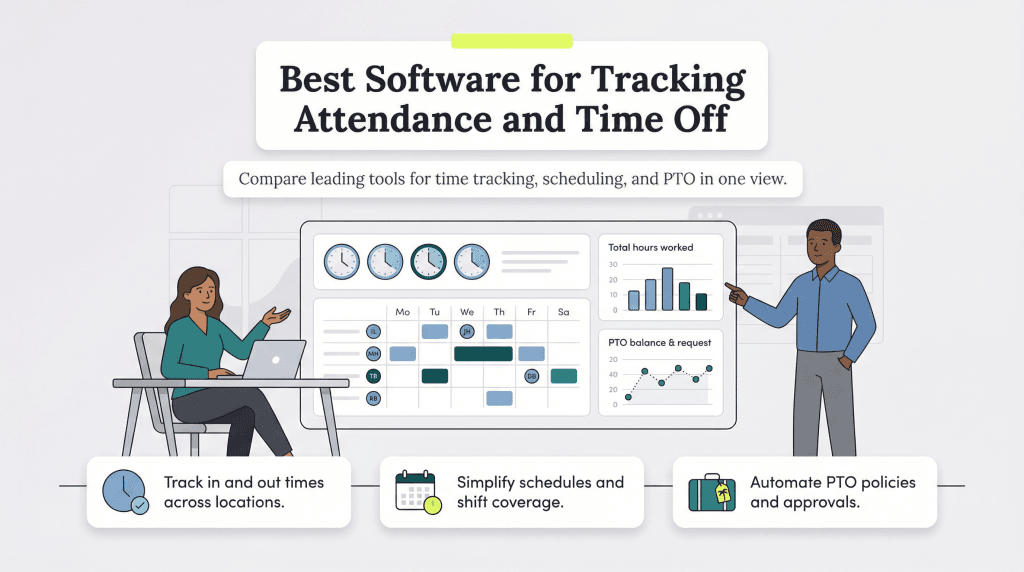From doctor visits to vacations to self-care days, your employees will inevitably need to take time off occasionally. Whether it’s for a family matter or a personal obligation, accommodating time-off requests is part of being an understanding and supportive employer. However, when excuses for missing work start to go off the rails, you may wonder when — and how — to draw the line.
Strange, unusual or bad excuses for missing work
While illness and car trouble are typical reasons for missing work, other excuses are a little off the wall. Here are some unusual excuses employers we interviewed have heard from their employees.
Going on the lam
Michael Reznik, head of Data & Analytics at the Baldwin Group, said the strangest excuse he ever received from an employee for missing work was that the employee had lost faith in the legal system and needed to go “on the lam.”
While the excuse seemed ridiculous on the surface, Reznik said that upon further questioning, the employee revealed he’d previously testified against some men, which resulted in them being sent to prison. The employee had learned the men were getting out early on parole and feared retribution.
“At first, I wasn’t sure how to handle it,” Reznik admitted. “It seemed a little far-fetched, but at the same time, I do care about my employees’ health and safety. I also had to consider other employees’ safety. If some ‘rough’ guys were going to come to our office looking for him, I really didn’t want him to be here.”
In the end, Reznik accepted the excuse, and the employee returned to work after a few days. But, a few months later, the same excuse came up again; this time, the employee left and never returned.
Y2K
We all remember the chaos that surrounded Y2K, but who knew it would be such a great excuse to get out of work? With over 30 years of experience in human resources, Norma Frahn, owner of On Demand HR Solutions, says she’s heard all the excuses. But, this one in particular stands out from early in her career.
“A young man who worked in the warehouse appeared in my office the last week of 1999,” Frahn recalled. “He was well-known for his creative absence excuses, so I was very curious what this one would be.”
This employee was an essential worker who was scheduled to work on Jan. 1, 2000. With all the hype about the world’s computer systems crashing, he asked what would happen if he got into his car to come to work and it didn’t start because “Y2K got to the computer chip in the engine.” He wanted to know if that absence would count against him.
“First, mad points for creatively thinking! But, sadly, I had to tell him that yes, it would in fact be a mark on his attendance record,” Frahn shared. “I reassured him that it was unlikely that the automobiles would all revolt, but if they did, rest assured, we would consider excusing his (and others’) absence, because after all, the company isn’t an inflexible monster!”
“Sometimes you just have to acknowledge the effort and creativity behind the excuse while still toeing the company line,” Frahn added.
Dirty laundry
Not every unusual excuse is laugh-out-loud funny; some raise more complex questions about mental health, boundaries and how much support an employer can realistically provide.
After a three-month illness, an employee contacted Richard Stone, managing director of technical PR agency Stone Junction, on the day she was due to return. She let him know she hadn’t been able to do laundry while ill and didn’t have anything clean to wear.
“Her suggestion was that she had been off so long that a few more days wouldn’t hurt, and she may as well postpone her restart until the following week so she could get her laundry up to date,” Stone recalled. The employee had spent a significant amount of time that year and the previous year on sick leave, so Stone was compassionate.
“Balancing this with her overall welfare, I reasoned that she must be in quite a dark place to say something like this,” Stone shared. Her sickness record never improved despite a lot of help, and she eventually left. “I think it’s an example of how, no matter how invested you are as an employer, you can’t help everyone,” he added.
A death in the family ― of the same person several times over
A death in the family is a perfectly legitimate excuse for missing work. The same family member dying multiple times is a different story. Ola Wlodarczyk, a quality assurance professional, once had an employee who called in on three different occasions with the excuse that their grandmother had passed away.
“It was obvious the employee was not telling the truth, but we had to be strategic in our response,” Wlodarczyk explained.
After the employee returned from their bereavement leave, they were brought into the HR office and confronted with the situation. Wlodarczyk said they were straightforward with the employee, showing them all previous requests and reasons — including the repeated grandmother-death excuses — for calling out of work.
“The employee went completely white,” Wlodarczyk recalled. “Still, we gave the employee a chance to tell us their side of the story. Of course, it’s possible someone misspoke or even categorizes someone as a close family member in this way, so we gave them a chance to tell their side of the story before disciplining them.”
Ultimately, the employee admitted that no relatives had recently passed away. In addition, Wlodarczyk said the HR team discovered a litany of other false excuses the employee had used to miss work.
“It was very eye-opening but a learning experience,” Wlodarczyk said. “If we had gone in and reprimanded the person off the bat, then we would not have uncovered these other lies. So, in the long run, keeping cool certainly helped us.”
Even when you catch an employee lying, it's important to offer them an opportunity to defend themselves. Always remain calm and fair, and document any
attendance policy breaches.
An unusual injury
In truly ironic fashion, Dr. Sandip Sachar, dentist and owner of Sachar Dental in Manhattan, New York, had a dental assistant call in sick on a very busy Monday morning due to a flossing-related injury.
The dental assistant decided to brush up (pun intended) on his flossing techniques to better teach patients how to floss. After turning to TikTok for some new tips and tricks, he came upon a video instructing the double loop technique. Apparently, this method suggested looping the floss twice around each hand for increased tension.
“While trying this technique to floss his molars, the floss snapped, presumably from that desired extra tension, and his fingernail came in contact with his right eye at a high velocity,” Sachar explained. “This was diagnosed in the urgent care center as a scratched cornea. He was given a note to remain out of work for three days in order to rest his eye, and avoid aerosolized particles at work from drilling and spraying in patients’ mouths.”
Sachar still wonders if the story is true. “I will never know, but it goes down as my most ironic calling-out in my 20-plus years of practice,” said Sachar. “A flossing injury, not from a patient, but from my own staff.”
Reduce sick days in your office by encouraging healthy eating, providing exercise resources and offering other wellness initiatives.
Pathological liar
Jean Paldan, founder and CEO of Rare Form New Media, hired someone who immediately started giving ridiculous excuses for missing work. On what was supposed to be his first day, the new employee called to say his apartment had flooded. The next day, his mother, who he said had dementia, had supposedly wandered off, and he had to find her.
Over the next four weeks, the employee claimed he couldn’t make it to work because he couldn’t find his medication, had norovirus and had to be with his pregnant girlfriend — even though it was later determined she wasn’t pregnant.
“We at first thought that he was just having a bad time of it with the flood and his mother, then catching the norovirus, and we were supportive,” Paldan recalled. “However, he started to flounder and forgot which lie he had told, and that’s when we realized he was a pathological liar. At that point, we decided to let him go.”
Wild-but-true excuses for missing work
While some outrageous excuses are made up, others are too ridiculous not to be true.
Multicause traffic incident
BJ Enoch, VP of digital marketing for Career Certified, recalled that on the morning of an important client meeting, one of his team members texted that he couldn’t make it because he was stuck in traffic after someone hit a deer — and their car caught on fire.
“I’d never had a reason to doubt this team member before and wanted to give him the benefit of the doubt, but this was just a bit too much,” Enoch explained.
Despite his doubts and desire for more answers, Enoch was texting the employee to be safe when he received a follow-up message. It included a picture of a car on fire in the middle of the highway with a deer on the side of the road.
“We chalked it up as uncontrollable, and he made the hours up,” Enoch added.
Goats gone wild
A herd of goats traipsing through a house is an excuse most couldn’t even fathom giving. However, that’s one that Kyle Birkemeier had to give his employer while working abroad.
“I had goats and had to call off work when I came home to find that someone had let them into the house and they pooped on everything,” Birkemeier explained. “My supervisors sure found it hilarious, and, eventually, I did as well.”
Not in the mood
“Yeah, I’m not coming in today. I just don’t want to.” That’s the excuse that stands out most to Gwenhwyfar Dunne-Henry, psychologist, performance psychotherapist and founder of Divinitiv.
“That was the whole message. No illness. No dead goldfish. Not even a fake car breakdown. Just a bold-faced declaration of zero interest in being productive,” Dunne-Henry recalled.
“I asked him the next day if everything was OK, and he said, ‘Oh yeah. I just woke up and thought, ‘Nah.'”
Other uncommon excuses HR reps and bosses have reported include needing to
nap on the job, participating in a peaceful Armenian revolution, not wanting to deal with "mean girl" co-workers and forgetting it was Monday.












